|
Books Should Be Free Loyal Books Free Public Domain Audiobooks & eBook Downloads |
|
|
Books Should Be Free Loyal Books Free Public Domain Audiobooks & eBook Downloads |
|
Science |
|---|
|
Book type:
Sort by:
View by:
|
By: H. G. Wells (1866-1946) | |
|---|---|
 Text Book of Biology, Vertebrata
Text Book of Biology, Vertebrata
| |
 Mankind in the Making
Mankind in the Making
| |
By: H. Gordon Montague | |
|---|---|
 Two New Pocket Gophers from Wyoming and Colorado
Two New Pocket Gophers from Wyoming and Colorado
| |
By: H. L. (Harry Luman) Russell (1866-1954) | |
|---|---|
 Outlines of Dairy Bacteriology, 8th edition A Concise Manual for the Use of Students in Dairying
Outlines of Dairy Bacteriology, 8th edition A Concise Manual for the Use of Students in Dairying
| |
By: H. L. Mencken (1880-1956) | |
|---|---|
 Prejudices, First Series
Prejudices, First Series
Mencken sharpens his pen and in a collection of short essays delivers acerbic opinions on issues and persons of the time. Among his targets in this volume are critics, H.G. Wells Thorstein Veblen, Arnold Bennett, William Dean Howells, Irvin S. Cobb. Mencken's critiques are delivered against a background of his own well known ethnic, racial, religious, and sectional prejudices. Not for the faint of heart, Mencken's prickly, yet unapologetic, prose reveals a window into American attitudes at the time they were written and their influences on the larger American culture. - Summary by DrPGould | |
By: H. Thompson (Harold Thompson) Rich (1893-1974) | |
|---|---|
 Spawn of the Comet
Spawn of the Comet
| |
By: H.A. Lorentz | |
|---|---|
 The Einstein Theory of Relativity
The Einstein Theory of Relativity
| |
By: Hal Hellman (1927-2016) | |
|---|---|
 Lasers
Lasers
Among great technologic developments of the twentieth century has to be that of laser light with its myriad of applications in industry, communication, medicine and many other fields. As author Hal Hellman says in conclusion in this 1968 publication, “Indeed the most exciting probability of all is that lasers undoubtedly will change our lives in ways we cannot even conceive of now.” And, so has it been, and this treatise gives insight into the early days of the research and development of lasers. This booklet is part of the Understanding the Atom Series from the United States Atomic Energy Commission Division of Technical Information. - Summary by Larry Wilson | |
By: Hal K. Wells (1900-) | |
|---|---|
 The Cavern of the Shining Ones
The Cavern of the Shining Ones
| |
 Devil Crystals of Arret
Devil Crystals of Arret
| |
 Zehru of Xollar
Zehru of Xollar
| |
By: Halliday G. Sutherland (1882-1960) | |
|---|---|
 Birth Control A Statement of Christian Doctrine against the Neo-Malthusians
Birth Control A Statement of Christian Doctrine against the Neo-Malthusians
| |
By: Hamilton Wright Mabie (1846-1916) | |
|---|---|
 Essays on Work and Culture
Essays on Work and Culture
The author investigates the world of work against a backdrop of culture. Each of the 25 essays focuses on one aspect of the topic. For example, the first essay, "Tool or Man?" looks at two views of man. One is that of strength as the provider of security. The other is that of aesthete, as an enthusiast of the arts or academics or religion. In our culture, provider of security is the winner every time. Man as a source of multiple talents cannot be allowed. As the author frames the argument, "Specialisation has been carried so far that it has become an organised tyranny... | |
By: Hans Gustav Adolf Gross (1847-1915) | |
|---|---|
 Criminal Psychology; a manual for judges, practitioners, and students
Criminal Psychology; a manual for judges, practitioners, and students
| |
By: Harl Vincent (1893-1968) | |
|---|---|
 Wanderer of Infinity
Wanderer of Infinity
| |
 Vulcan's Workshop
Vulcan's Workshop
| |
 The Copper-Clad World
The Copper-Clad World
| |
 Creatures of Vibration
Creatures of Vibration
| |
By: Harold Jacoby (1865-1932) | |
|---|---|
 Practical Talks by an Astronomer
Practical Talks by an Astronomer
The present volume has not been designed as a systematic treatise on astronomy. There are many excellent books of that kind, suitable for serious students as well as the general reader; but they are necessarily somewhat dry and unattractive, because they must aim at completeness. Completeness means detail, and detail means dryness. But the science of astronomy contains subjects that admit of detached treatment; and as many of these are precisely the ones of greatest general interest, it has seemed well to select several, and describe them in language free from technicalities... | |
By: Harold L. Goodwin (1914-1990) | |
|---|---|
 Rip Foster Rides the Gray Planet
Rip Foster Rides the Gray Planet
"Foster, Lieutenant, R. I. P.," blared the voice horn, and five minutes later Rip Foster was off into space on an assignment more exciting than any he had ever imagined. He could hardly believe his ears. Could a green young Planeteer, just through his training, possibly carry out orders like these? Sunny space, what a trick it would be! From the moment Rip boards the space ship Scorpius there is a thrill a minute. He and his nine daring Planeteers must cope with the merciless hazing of the spacemen commanding the ship, and they must outwit the desperate Connies, who threaten to plunge all of space into war... | |
 Rip Foster in Ride the Gray Planet
Rip Foster in Ride the Gray Planet
| |
By: Harold Steele MacKaye (1866-1928) | |
|---|---|
 The Panchronicon
The Panchronicon
| |
By: Harriet Beecher Stowe (1811-1896) | |
|---|---|
 Queer Little Folks
Queer Little Folks
A wonderful children's classic - a collection of moral stories told by animals in the woods. The wittily written stories explore various issues in a fun way. | |
By: Harriet E. (Harriet Eliza) Paine (1845-1910) | |
|---|---|
 Girls and Women
Girls and Women
| |
By: Harriett Bradley (1892-) | |
|---|---|
 The Enclosures in England An Economic Reconstruction
The Enclosures in England An Economic Reconstruction
| |
By: Harry Bates (1900-1981) | |
|---|---|
 Under Arctic Ice
Under Arctic Ice
| |
By: Harry Best (1880-) | |
|---|---|
 The Deaf Their Position in Society and the Provision for Their Education in the United States
The Deaf Their Position in Society and the Provision for Their Education in the United States
| |
By: Harry Chase Brearley (1870-1940) | |
|---|---|
 Time Telling Through the Ages
Time Telling Through the Ages
A history of timekeeping from the stone age through to American mass production, covering timepieces from the sundial and water clock through the key inventions driving advances in the accuracy of clocks and watches in both Europe and America. The book was conceived and sponsored by the Ingersoll Family as a celebration of their then 25 years of watchmaking. - Summary by Chris Cartwright | |
By: Harry Harrison (1925) | |
|---|---|
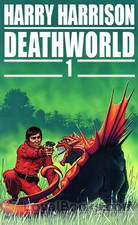 Deathworld
Deathworld
Jason dinAlit, an inhabitant of the planet Porgostrosaand, is a fast talking, conniving, tough as nails, gun toting gambler whose ethics wax and wane with each planet he travels to. He also has amazing psionic abilities which means he is gifted with a variety of psychic abilities including telekinesis, telepathy, pyrokinesis and a host of other interesting capabilities. He is not above using these to tip the odds in his favor while gambling. A chance meeting with Kerk Pyrrus who is the Ambassador of planet Pyrrus ends up with dinAlit traveling back with the Ambassador to Pyrrus... | |
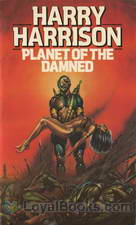 Planet of the Damned
Planet of the Damned
Once in a generation, a man is born with a heightened sense of empathy. Brion Brandd used this gift to win the Twenties, an annual physical and mental competition among the best and smartest people on Anvhar. But scarcely able to enjoy his victory, Brandd is swept off to the hellish planet Dis where he must use his heightened sense of empathy to help avert a global nuclear holocaust by negotiating with the blockading fleet, traversing the Disan underworld, and cracking the mystery of the savagely ruthless magter. Summary by Great Plains. | |
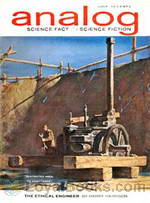 The Ethical Engineer
The Ethical Engineer
The Ethical Engineer also known as Deathworld II finds our hero Jason dinAlt captured to face justice for his crimes, but the ever-wily gambler crashes his transport on a primitive planet populated by clans that hoard knowledge. It’s a difficult situation for a guy who just wants to get back to Pyrrus. – The Ethical Engineer was first published in the July and August 1963 issues of Analog Science Fact & Fiction. | |
 The Misplaced Battleship
The Misplaced Battleship
"It might seem a little careless to lose track of something as big as a battleship ... but interstellar space is on a different scale of magnitude. But a misplaced battleship—in the wrong hands!—can be most dangerous." The world class con man and thief known as the Stainless Steel Rat (diGriz) has another very big problem to solve and this science fiction novella by the great Harry Harrison will see if he can solve it and perhaps four or five more like it before this fascinating and funny tale is finished. 'Use a thief to catch a thief' sounds great but it sometimes has unexpected results. | |
 Arm of the Law
Arm of the Law
A quiet backwater outpost on Mars gets a surprise in the form of a new police recruit - in a box! Yep, it's a prototype robot cop sent to the backwater station for testing. And Harrison tells the strange, funny and scary things that begin to happen after that, as only he can. | |
 The K-Factor
The K-Factor
The human race has reached the stars, colonized many planets and done amazing things in all areas of scientific progress. But humans are still humans and remain both honorable and not so honorable; some with high ideals and others with very low ones indeed. So why hasn't war occurred in several centuries among the hundreds of planets? Has man really changed? Not on your life it hasn't! Read how science has given man peace but at what cost? | |
 The Repairman
The Repairman
This is a collection of 3 of Harry Harrison marvelous early stories that were published in Galaxy, Analog and Fantastic Universe. The Repairman (1958) is a straight fun SF story of a man getting a job done. It is most typical of his later style in series like the Stainless Steel Rat; Toy Shop (1962), a short piece exploring bureaucratic blindness and one ingenious way around it and The Velvet Glove (1956), my favorite for its writing style, fun perspective, sly social commentary on the scene in 1956 and just plain delightful imagination. And he manages to pack excitement and mystery in at the same time. | |
 Toy Shop
Toy Shop
| |
 Navy Day
Navy Day
| |
 The Velvet Glove
The Velvet Glove
| |
By: Harry Rimmer (1890-1952) | |
|---|---|
 Dead Men Tell Tales
Dead Men Tell Tales
"Dead men tell no tales" was a common adage before the days of forensic science. In this book, the well-known evangelist and scientist uses Egyptology and archaeology to counter the argument in the investigation of Bible lore.. - Summary by Lynne Thompson | |
By: Harry Stephen Keeler (1890-1967) | |
|---|---|
 John Jones's Dollar
John Jones's Dollar
| |
By: Harvey Newcomb (1803-1863) | |
|---|---|
 A Practical Directory for Young Christian Females Being a Series of Letters from a Brother to a Younger Sister
A Practical Directory for Young Christian Females Being a Series of Letters from a Brother to a Younger Sister
| |
By: Havelock Ellis (1859-1939) | |
|---|---|
 Studies in the Psychology of Sex, Volume One
Studies in the Psychology of Sex, Volume One
The first of six volumes, this volume covers in extensive detail the topics of "The Evolution of Modesty", "The Phenomena of Sexual Periodicity", and "Auto-Eroticism". Written as an anthropological and psychological study from the point of view of Havelock, the famous British sexologist of the late 19th century, who was also a physician and social reformer. | |
 Essays in War-Time Further Studies in the Task of Social Hygiene
Essays in War-Time Further Studies in the Task of Social Hygiene
| |
 The Task of Social Hygiene
The Task of Social Hygiene
| |
By: Helen Campbell (1839-1918) | |
|---|---|
 Women Wage-Earners Their Past, Their Present, and Their Future
Women Wage-Earners Their Past, Their Present, and Their Future
| |
 Prisoners of Poverty Abroad
Prisoners of Poverty Abroad
| |
By: Helen Follett Jameson (1873-) | |
|---|---|
 The Woman Beautiful or, The Art of Beauty Culture
The Woman Beautiful or, The Art of Beauty Culture
| |
By: Helen Huber | |
|---|---|
 I'll Kill You Tomorrow
I'll Kill You Tomorrow
| |
By: Helen Keller (1888-1968) | |
|---|---|
 The Story of My Life
The Story of My Life
An autobiography of Helen Keller published when the author was still in her early 20's. The narrative reveals how her mind developed and matured until she began her studies at Radcliffe College | |
 The World I Live In
The World I Live In
The World I Live In by Helen Keller is a collection of essays that poignantly tells of her impressions of the world, through her sense of touch, smell, her imagination and dreams. My hand is to me what your hearing and sight together are to you. In large measure we travel the same highways, read the same books, speak the same language, yet our experiences are different. All my comings and goings turn on the hand as on a pivot. It is the hand that binds me to the world of men and women. The hand is my feeler with which I reach through isolation and darkness and seize every pleasure, every activity that my fingers encounter... | |
By: Helen M. Urban | |
|---|---|
 The Glory of Ippling
The Glory of Ippling
| |
By: Helena Swanwick (1864-1939) | |
|---|---|
 Future of the Women's Movement
Future of the Women's Movement
"There may seem to be a disappointing lack of prophesy in a book avowedly dealing with the future; but since I believe the women’s movement to be a seeking for knowledge and good, to show what is reasonable and good in the movement is to show what will persist and triumph. Through all our faults and mistakes, we women are aiming at better understanding and co-operation with men, and a better adaptation to one another of conditions and persons. We are having to hammer out for ourselves the right principles of government... | |
By: Henny Kindermann | |
|---|---|
 Lola or, The Thought and Speech of Animals
Lola or, The Thought and Speech of Animals
| |
By: Henri Poincaré (1854-1912) | |
|---|---|
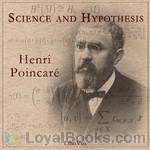 Science and Hypothesis
Science and Hypothesis
Jules Henri Poincaré (1854–1912) was one of France’s greatest mathematicians and theoretical physicists, and a philosopher of science. As a mathematician and physicist, he made many original fundamental contributions to pure and applied mathematics, mathematical physics, and celestial mechanics. He was responsible for formulating the Poincaré conjecture, one of the most famous problems in mathematics. In his research on the three-body problem, Poincaré became the first person to discover a chaotic deterministic system which laid the foundations of modern chaos theory... | |
By: Henry A. (Henry Augustus) Mott (1852-1896) | |
|---|---|
 Was Man Created?
Was Man Created?
| |
By: Henry Brodribb Irving (1870-1919) | |
|---|---|
 A Book of Remarkable Criminals
A Book of Remarkable Criminals
| |
By: Henry David Thoreau (1817-1862) | |
|---|---|
 Walden
Walden
Two years, two months and two days! This is what forms the time line of one man's quest for the simple life and a unique social experiment in complete self reliance and independence. Henry David Thoreau published Walden in 1884. Originally drafted as a series of essays describing a most significant episode in his life, it was finally released in book form with each essay taking on the form of a separate chapter. Thoreau's parents were in financial straights, but rich intellectually and culturally... | |
By: Henry Ebenezer Handerson | |
|---|---|
 Gilbertus Anglicus Medicine of the Thirteenth Century
Gilbertus Anglicus Medicine of the Thirteenth Century
| |
By: Henry Edward Crampton (1875-) | |
|---|---|
 The Doctrine of Evolution Its Basis and Its Scope
The Doctrine of Evolution Its Basis and Its Scope
| |
By: Henry Ernest Dudeney | |
|---|---|
 Amusements in Mathematics
Amusements in Mathematics
AMUSEMENTS IN MATHEMATICSby HENRY ERNEST DUDENEYPREFACEIn issuing this volume of my Mathematical Puzzles, of which some have appeared in periodicals and others are given here for the first time, I must acknowledge the encouragement that I have received from many unknown correspondents, at home and abroad, who have expressed a desire to have the problems in a collected form, with some of the solutions given at greater length than is possible in magazines and newspapers. Though I have included a few old puzzles that have interested the world for generations, where I felt that there was something new to be said about them, the problems are in the main original... | |
By: Henry Faudel | |
|---|---|
 Suggestions to the Jews for improvement in reference to their charities, education, and general government
Suggestions to the Jews for improvement in reference to their charities, education, and general government
| |
By: Henry Harris Jessup (1832-1910) | |
|---|---|
 The Women of the Arabs
The Women of the Arabs
| |
By: Henry Hasse (1913-1977) | |
|---|---|
 We're Friends, Now
We're Friends, Now
| |
 Walls of Acid
Walls of Acid
| |
By: Henry Josephs | |
|---|---|
 The Fourth Invasion
The Fourth Invasion
| |
By: Henry L. Mencken (1880-1956) | |
|---|---|
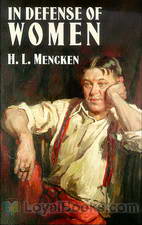 In Defense of Women
In Defense of Women
In Defense of Women is H. L. Mencken’s 1918 book on women and the relationship between the sexes. Some laud the book as progressive while others brand it as reactionary. While Mencken didn’t champion women’s rights, he described women as wiser in many novel and observable ways, while demeaning average men. According to Mencken’s biographer, Fred Hobson: Depending on the position of the reader, he was either a great defender of women’s rights or, as a critic labelled him in 1916, ‘the greatest misogynist since Schopenhauer’,'the country’s high-priest of woman-haters.’ | |
By: Henry Lindlahr (1862-1924) | |
|---|---|
 Nature Cure
Nature Cure
| |
By: Henry Lovejoy Ambler (1843-1924) | |
|---|---|
 Tin Foil and Its Combinations for Filling Teeth
Tin Foil and Its Combinations for Filling Teeth
| |
By: Henry M. Field (1822-1907) | |
|---|---|
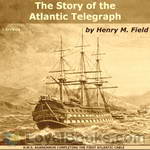 The Story of the Atlantic Telegraph
The Story of the Atlantic Telegraph
Cyrus W. Field had a dream: to link the Old World of Britain and Europe to that of the New World of North America by a telegraph cable stretching across the great Atlantic Ocean. It took him thirteen years, a lot of money, and many men and ships and cable to make it happen. He wanted to bring the world together and make it a smaller place; to forge alliances and achieve peace. This is his story. (Introduction by Alex C. Telander) | |
By: Henry N. (Henry Neely) Ogden (1868-) | |
|---|---|
 Rural Hygiene
Rural Hygiene
| |
By: Henry P. Talbot | |
|---|---|
 An Introductory Course of Quantitative Chemical Analysis With Explanatory Notes
An Introductory Course of Quantitative Chemical Analysis With Explanatory Notes
| |
By: Henry Raymond Rogers (1822-1901) | |
|---|---|
 New and Original Theories of the Great Physical Forces
New and Original Theories of the Great Physical Forces
| |
By: Henry Rider Haggard (1856-1925) | |
|---|---|
 When the World Shook; being an account of the great adventure of Bastin, Bickley and Arbuthnot
When the World Shook; being an account of the great adventure of Bastin, Bickley and Arbuthnot
| |
By: Henry Slesar (1927-2002) | |
|---|---|
 The Delegate from Venus
The Delegate from Venus
| |
 Reluctant Genius
Reluctant Genius
| |
 The Success Machine
The Success Machine
| |
By: Henry Smith Williams (1863-1943) | |
|---|---|
 A History of Science
A History of Science
| |
By: Henry Theophilus Finck (1854-1926) | |
|---|---|
 Primitive Love and Love-Stories
Primitive Love and Love-Stories
| |
By: Henry Walter Bates (1825-1892) | |
|---|---|
 The Naturalist on the River Amazons
The Naturalist on the River Amazons
| |
By: Henry Ward Beecher (1813-1887) | |
|---|---|
 Twelve Causes of Dishonesty
Twelve Causes of Dishonesty
| |
By: Henry Weightman Stelwagon (1853-1919) | |
|---|---|
 Essentials of Diseases of the Skin Including the Syphilodermata Arranged in the Form of Questions and Answers Prepared Especially for Students of Medicine
Essentials of Diseases of the Skin Including the Syphilodermata Arranged in the Form of Questions and Answers Prepared Especially for Students of Medicine
| |
By: Herbert B. Livingston | |
|---|---|
 Daughters of Doom
Daughters of Doom
| |
By: Herbert D. Kastle | |
|---|---|
 The First One
The First One
| |
By: Herbert Feis (1893-1972) | |
|---|---|
 The Settlement of Wage Disputes
The Settlement of Wage Disputes
| |
By: Herbert J. Hall (1870-1923) | |
|---|---|
 The Untroubled Mind
The Untroubled Mind
A very wise physician has said that “every illness has two parts—what it is, and what the patient thinks about it.” What the patient thinks about it is often more important and more troublesome than the real disease. What the patient thinks of life, what life means to him is also of great importance and may be the bar that shuts out all real health and happiness. The following pages are devoted to certain ideals of life which I would like to give to my patients, the long-time patients who have especially fallen to my lot. | |
By: Herbert Joseph Moorhouse (1882-) | |
|---|---|
 Deep Furrows
Deep Furrows
| |
By: Herbert Mayo (1796-1852) | |
|---|---|
 Popular Superstitions, and the Truths Contained Therein
Popular Superstitions, and the Truths Contained Therein
"In the following Letters I have endeavoured to exhibit in their true light the singular natural phenomena of which old superstition and modern charlatanism in turn availed themselves—to indicate their laws, and to develop their theory." In 14 letters, British physiologist Herbert Mayo is giving the reader an overview of popular superstitions of previous times, like vampirism, somnambulism or even ghost sightings, and exposing how in previous times they were treated with fear, ignorance and intolerance, often leading to crime, while he endeavours to give rational explanations for the phenomena with the goal to find treatments and cures for the afflicted. - Summary by Sonia | |
By: Herbert Spencer (1820-1903) | |
|---|---|
 Essays: Scientific, Political, & Speculative, Vol. I
Essays: Scientific, Political, & Speculative, Vol. I
| |
By: Horace Brown Fyfe (1918-1997) | |
|---|---|
 Irresistible Weapon
Irresistible Weapon
| |
 The Outbreak of Peace
The Outbreak of Peace
| |
 A Transmutation of Muddles
A Transmutation of Muddles
| |
 This World Must Die!
This World Must Die!
| |
 Flamedown
Flamedown
| |
 Satellite System
Satellite System
| |
 The Talkative Tree
The Talkative Tree
| |
 Exile
Exile
| |
By: Horace Curzon Plunkett (1854-1932) | |
|---|---|
 The Rural Life Problem of the United States Notes of an Irish Observer
The Rural Life Problem of the United States Notes of an Irish Observer
| |